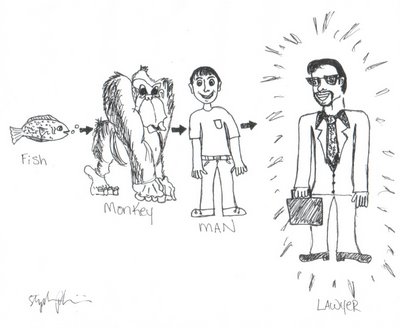Week Two, Part 7 - Deadly Sins
 My failure to study Dean Link’s 60-80 hours a week cannot all be blamed on duties at home, unfortunately. I’m responsible as well. Too often I read the newspaper when I should be briefing cases. In my list of the Seven Deadly Sins of Time Mismanagement, it’s number one.
My failure to study Dean Link’s 60-80 hours a week cannot all be blamed on duties at home, unfortunately. I’m responsible as well. Too often I read the newspaper when I should be briefing cases. In my list of the Seven Deadly Sins of Time Mismanagement, it’s number one.Every day around noon, I stop by the law school lounge and pick up an Observer, the student paper at Notre Dame. Contrary to the conventional wisdom, I think it’s a great read – although compared to Pennoyer v. Neff, most anything is. About half the articles are student generated, the others pulled from the AP wire.
The Observer often has a piece about Notre Dame football, so I start at the sports section on the back page. There are several articles predicting which freshmen will earn the most playing time. In one, the author bemoans wide receiver Randy Moss, the prize recruit who got away. Another speculates on the chances of quarterback Ron Powlus to win the Heisman Trophy.
In the middle of the Observer are the editorial pages, called “Viewpoint.” The most interesting letter to the editor is from Pieder Beeli, a graduate student in physics. On the topic of biological evolution, he takes umbrage with the neo-Darwinian “fish to man theory that is dogmatically taught” at Notre Dame.
Beeli challenges the professors in the anthropology department to respond with proof of one instance where “an organism gains beneficial genetic information... from random mutational events” as it “develops to a state of greater complexity.” In his last paragraph, Beeli goads them a bit: “After 136 years of Darwinism, they certainly should be able to produce one example.”
Beeli is like William Jennings Bryan, a lawyer and three-time presidential candidate for the Democratic Party. Bryan would offer to pay anyone $100 for proof that man evolved from monkeys. In 1925, Bryan helped prosecute a biology instructor who violated a Tennessee law against teaching that man had descended from lower order animals. State of Tennessee v. John Scopes was the first “trial of the century.”
I’m interested to see if any anthro profs respond to Beeli. It’s an important debate, I think, extending beyond science to legal and religious ideas such as justice and morality. To quote Oxford’s Richard Dawkins in River Out of Eden: A Darwinian View of Life:
In a universe of electrons and selfish genes, blind physical forces and genetic replication, some people are going to get hurt, other people are going to get lucky, and you won't find any rhyme or reason in it, nor any justice. The universe that we observe has precisely the properties we should expect if there is, at bottom, no design, no purpose, no evil, no good, nothing but pitiless indifference.
Interesting, I think. No justice. No evil. No good. And certainly no Seven Deadly Sins.
* * *

1 Comments:
Beeli strikes again: https://www.youtube.com/watch?v=wiilzMYRTPs
Post a Comment
<< Home